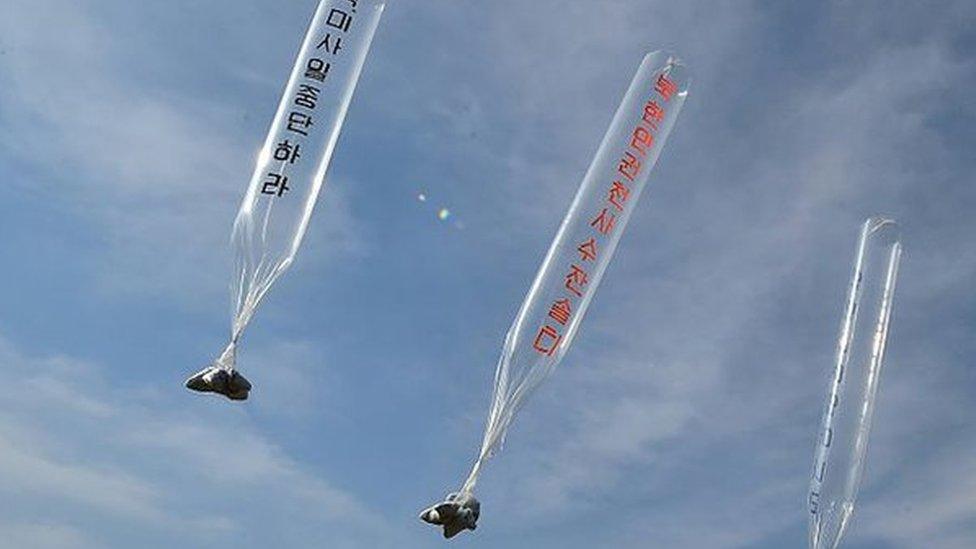North Korea's Kim Jong-un pledges 'new history' with South Korea
- Published
The moment Kim Jong-un crossed into South Korea
Kim Jong-un has pledged a "new history" in relations with his neighbour as he became the first North Korean leader to set foot in South Korea since the end of the Korean War in 1953.
In a moment rich with symbolism and pomp, South Korean leader Moon Jae-in and Mr Kim shook hands at the border.
Mr Kim said it was the "starting point" for peace, after crossing the military line that divides the peninsula.
It comes just months after warlike rhetoric from North Korea.
Much of what the summit will focus on has been agreed in advance, but many analysts remain sceptical about the North's apparent enthusiasm for engagement.
The leaders were met on Friday by an honour guard in traditional costume on the South Korean side. The pair walked to the Peace House in Panmunjom, a military compound in the demilitarised zone (DMZ) between the two countries.
Kim's route to the talks

Mr Kim then invited the South Korean president to step briefly across the demarcation line into North Korea, before the pair stepped back into South Korea - all the while holding hands.
It was an apparently unscripted moment during a highly choreographed sequence of events.
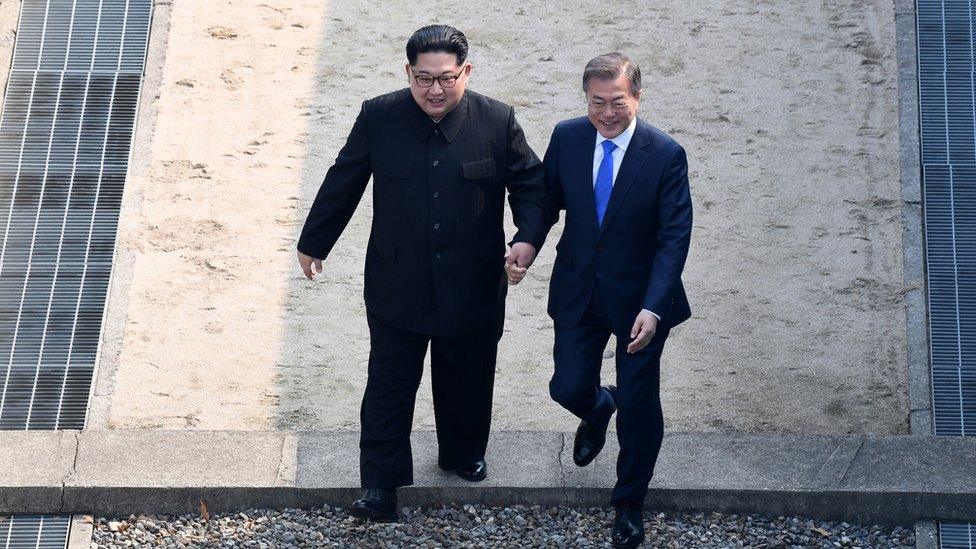
The meeting is aimed at ending the decades-long conflict on the peninsula
When the first session ended, the pair separated for lunch and Mr Kim returned to the North in a heavily guarded black limousine.
When he returned in the afternoon, the leaders took part in a ceremony consisting of the planting of a pine tree using soil and water from both countries.
The pair shovelled soil on the roots of the tree and unveiled a stone marker featuring their names, official titles and a message that read: "Planting peace and prosperity."
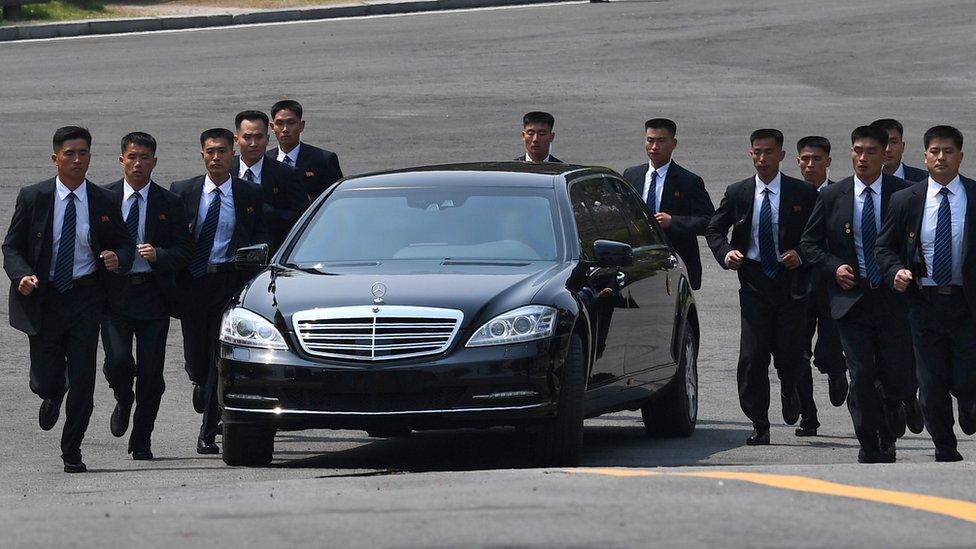
Mr Kim returns to the North in a car surrounded by bodyguards
The summit will conclude with the leaders signing an agreement and delivering a joint statement before dinner. The banquet will be held on the South's side and the menu is as symbolic as the other rituals.
Mr Kim will be served the Swiss potato dish rösti - a nod to his time studying in Switzerland - along with the North's signature dish of cold noodles, and a North Korean liquor.
Mr Kim is accompanied by nine officials, including his powerful and influential sister Kim Yo-jong.
Why is this important?
The meeting - the first between Korean leaders in more than a decade - is seen as a step toward possible peace on the peninsula and marks the first summit of its kind for Mr Kim.
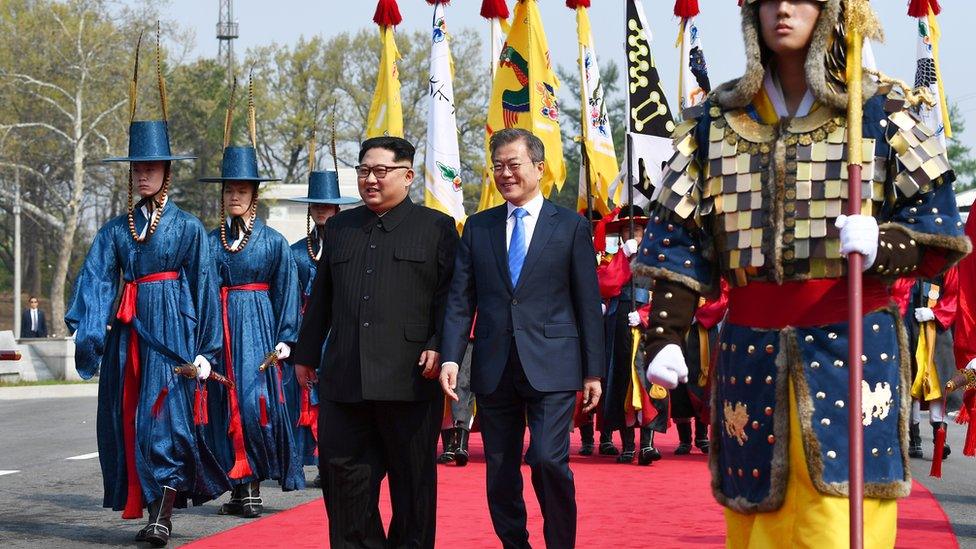
It is the first time Korean leaders have met in more than a decade
It carries promise for both Koreas with topics being discussed ranging from nuclear technology and sanctions to separated families, and is seen as an opportunity to foster economic co-operation.
"I feel that [we] have fired a flare at the starting point... the moment of writing a new history vis-à-vis peace, prosperity and North-South relations," Mr Kim said ahead of talks with Mr Moon at the Peace House in the border village of Panmunjom.
"A new history begins now," he also wrote in a guestbook.
The White House has expressed hope that the talks will achieve progress towards peace ahead a proposed meeting between Mr Kim and US President Donald Trump in the coming weeks - an unprecedented move.
What about the nuclear issue?
Talks are likely to focus on reaching an agreement on North Korea's nuclear weapons programme, which has advanced significantly since the last summit more than a decade ago.
Seoul has warned that a deal to rid Pyongyang of its nuclear weapons will be "difficult" to achieve.
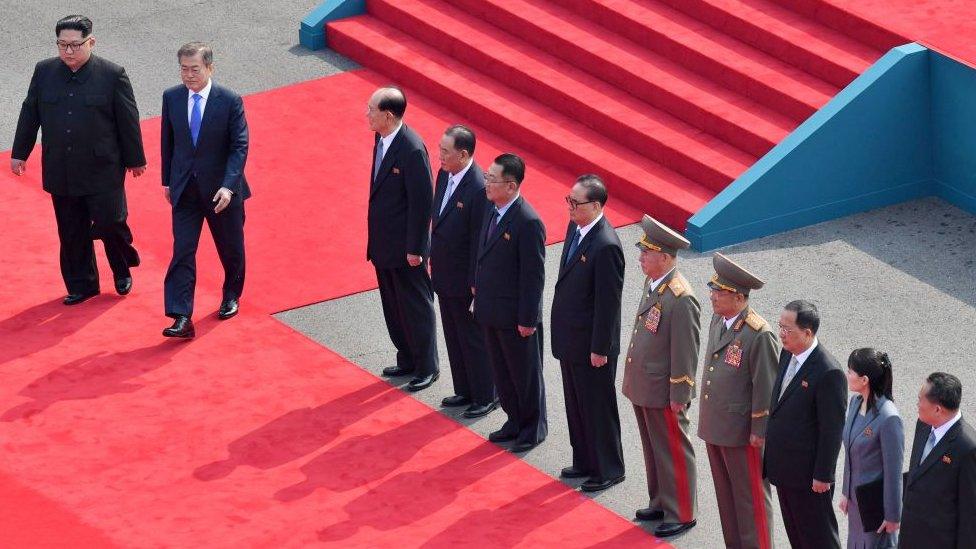
The leaders appeared at ease in their first face-to-face meeting
Mr Kim announced last week that he was suspending nuclear tests.
The move was welcomed by the US and South Korea, although Chinese researchers have indicated that North Korea's nuclear test site may be unusable after a rock collapse following its last nuclear test.
As well as addressing Pyongyang's nuclear ambitions, the leaders are expected to discuss a formal end to the 1950-53 Korean War, as well as economic and social issues.
How did we get here?
Few had predicted a development like this, as North Korea continued its nuclear and missile tests and stepped up its rhetoric through 2016 and 2017.
The rapprochement began in January when Mr Kim suggested he was "open to dialogue" with South Korea.
The following month the two countries marched under one flag at the opening ceremony of the Winter Olympics.
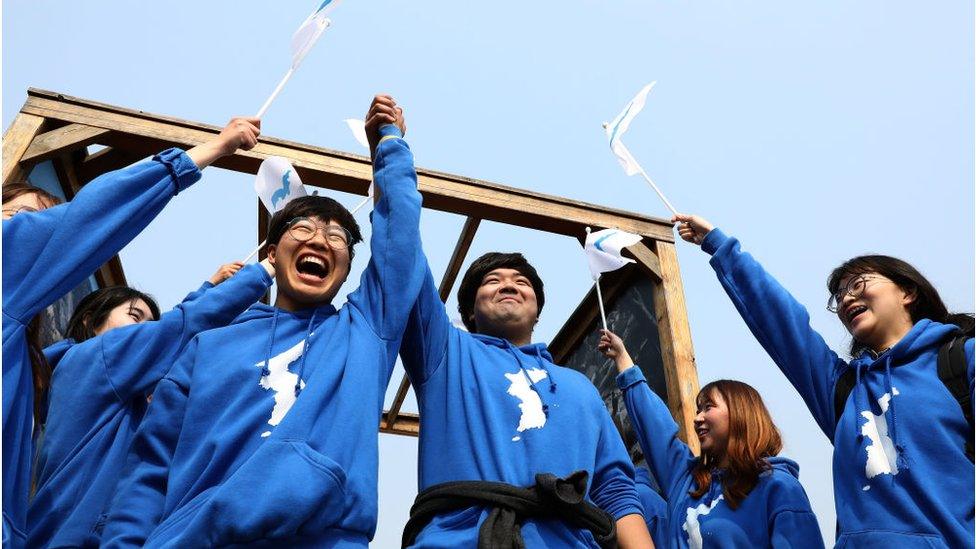
Many South Koreans were overcome with emotion as they watched the historic moment live on television
Mr Kim's new appetite for diplomacy led to the key turning point, which was a meeting with senior South Korean officials in March, and after that came the announcement that Mr Kim would also meet Mr Trump.
- Published27 April 2018
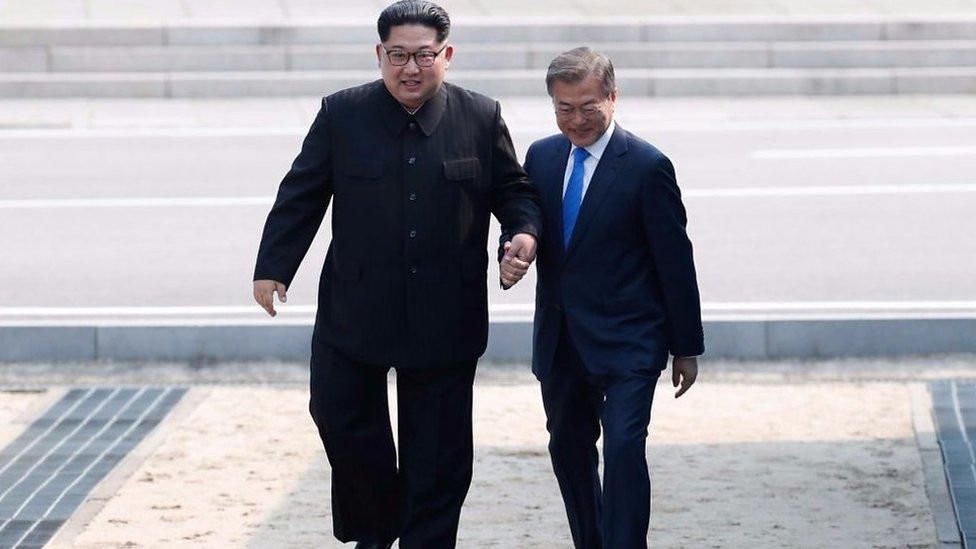
- Published26 April 2018
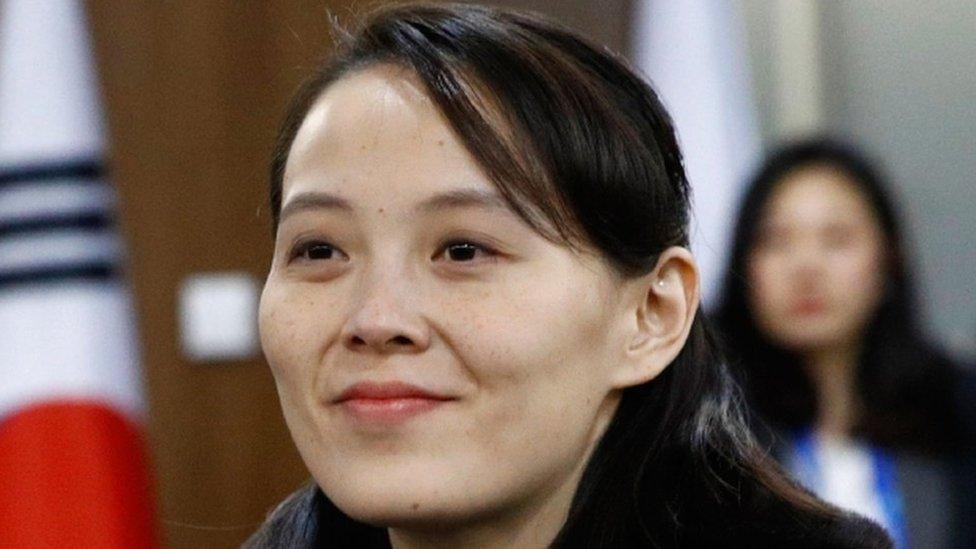
- Published24 April 2018
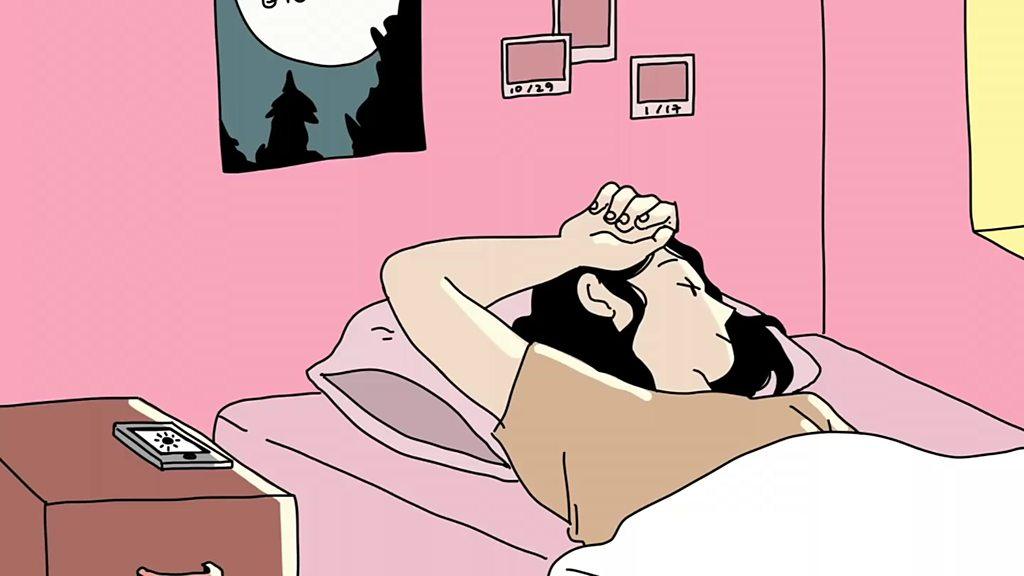
- Published26 April 2018
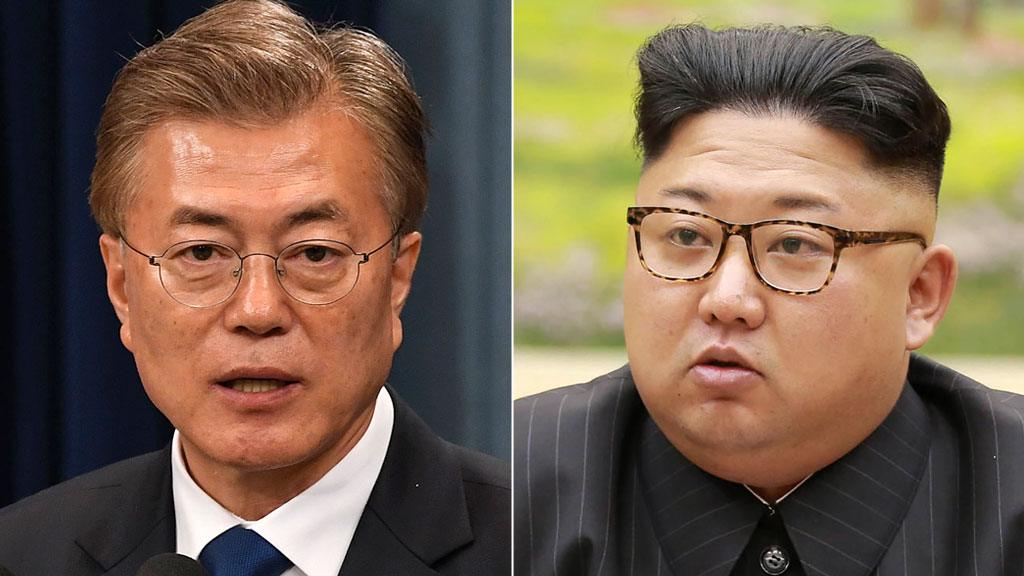
- Published25 April 2018
